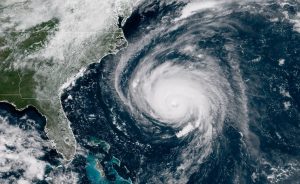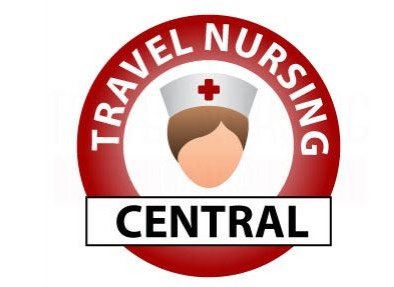
A look at Hurricane Florence from space. The Category 2 storm is expected to hit the East Coast this weekend.
Hurricane Florence is expected to make landfall near the Carolina coast later today and into the weekend. Forecasters are already calling it “the storm of a lifetime.” Are you in the path of the storm? If you are, don’t panic. Here’s what travel nurses can do to stay safe before and after a natural disaster while on assignment.
Before the storm:
Learn your facility’s emergency response plan: Most facilities have an emergency response plan in place to protect their patients and staff during critical events or natural disasters. In some cases, hospitals will even evacuate their patients if they can. However, just like hospitals, no two emergency response plans are alike. So, make sure you understand your role within that plan. Your unit manager should be able to brief you on your specific role and answer any of your questions.
Stock up on supplies: Prepare for what you’ll need before and after a natural disaster. The American Red Cross recommends this handy checklist of emergency supplies. For example, you should have a 2-week supply of non-perishable food and water as well as a full tank of gas in your car. You may also want to purchase a battery-powered NOAA Weather Radio so you can get the latest information from the National Weather Service.
Consider your housing situation: Make sure you have a Plan B for housing in the event that your current living situation becomes uninhabitable. Talk with your recruiter and your facility managers beforehand to determine your best course of action.
After the storm:
Contact your friends and family: Let your loved ones know you are safe. You can do so on Facebook or use the Safe and Well website. As a travel nurse, it’s also a great idea to put your recruiter on this list.
Avoid flooded areas and downed power lines: Flooding brings with it the risk of waterborne bacterial contamination and downed power lines pose a potential threat in the aftermath of a storm.
Don’t drink the tap water until authorities have given the all-clear. Tap water might not be safe to drink immediately following a natural disaster, so use your bottled water and/or boil the tap water before you use it.
Should you ever find yourself preparing for a natural disaster while on assignment, we hope these tips can help you stay safe. Thank you to all the travel nurses who have weathered similar storms or disasters in the name of patient care! You inspire all of us!


This article is a very good source of informative information that is very useful and helpful to us. Now I can be aware and can be prepared when hurricane came.